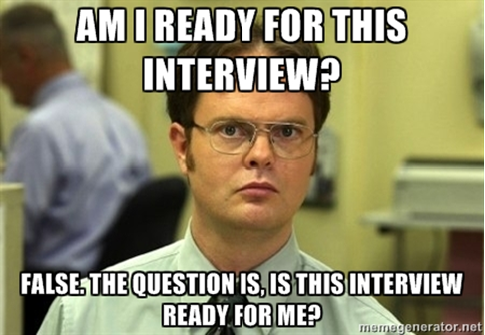If you have a job interview, make sure you ask yourself this question before moving forward.
If you’ve already aced the other parts of what can often be an extensive application, not preparing for the skills assessment test is akin to fumbling the football at the 10-yard line – don’t miss that touchdown!
What is a skills assessment test?
First, you need to know what the point of a skills assessment test is. The overall goal of a skills assessment test is to determine if you, the candidate, are qualified for the position. The skills assessment is designed to do two things. First, it will help the company you’re applying to determine if you have the necessary technical skills to be successful in the role. Second, it will give you insight into the kinds of projects you will be working on to help you decide whether the role is the right fit for you!
There are several kinds of tests from soft skills evaluations and technical skills assessments to personality and cognitive ability tests. They’ll be looking for all those things throughout the process, but establishing a test for particular skills also allows employers to rule out biases in their hiring process and make sure the person they end up hiring is a good match for the company.
One study found that companies that used skills assessment tests had a 39% lower turnover rate, meaning that successful candidates were better for the role. So really, doing well in the assessment process is helpful for your overall happiness and wellbeing within the company, too.
Step One: Understand the Type of Skills Assessment Test You’ll Receive
If the hiring process isn’t clearly laid out, don’t be afraid to reach out to your contact and ask what the interview process involves. Find out whether or not you’ll have a test to perform, as well as what kind. If you’re applying for tech roles, your employer will likely want to prove you have the skills.
Even if you haven’t perfected every technical skill the employer wants, the assessment may still be helpful. Besides identifying skill gaps, some are designed to help employers discover which candidates can learn new skills quickly.
Step Two: Know What the Skills Assessment Looks at
Here’s a brief overview of the kinds of assessments you may come across and what their purpose is. The more you understand them, the better you can prepare and perform.
1. Technical skills assessment tests
The company will have you perform technical tasks involved with the role you’ve applied for to make sure you can actually do what you say you can and what the role requires. The so-called “hard tasks.” These tests could be highly technical in nature including a coding test using the company’s tech stack, or it could be a writing assignment to understand your research methods, writing style etc.
2. Cognitive skills test
Think of cognitive skills tests as the opposite of technical skills tests. Rather than hard skills, a cognitive abilities test looks at your soft skills, such as problem-solving, critical thinking, and attention to detail.
3. Personality characteristics
This test is mostly to see how you would fit in with the rest of the company via their company culture. Plus, for certain roles, a candidate’s personality is an asset. Imagine hiring an extremely shy and introverted salesperson or someone who’s stubbornly independent for a team-oriented role. Neither the successful candidate nor the employer would be happy with the result.
Pro tip: If you can, ask what type of personality test they use in their assessments, as there are several standard tests available.
4. Work sample test
Similar to a tech assessment, the work sample is, again, to prove you can walk the walk. This could be as simple as providing them with links to previous work or a portfolio. This is your chance to put your best foot forward. Make it easy for the interviewer to access your work (we suggest a Google drive link or a PDF), and clearly indicate what you were involved in when it came to the project.
Step Three: Research, Research, Research
The third step to acing your test shouldn’t come as a surprise: Do the research. Find out about the company, look at their hiring process, understand why they may be performing the tests they do, and get a clear picture of the role you’re applying for — what’s the team structure, the overall goal, what are the basic skills, and where it can take you in the company. Try to understand their employer brand, too. It will tell you a lot about what the company is looking for and how the ideal candidate will fit in. As the old saying goes, “Knowledge is power.”
Step Four: Don’t Put it Off
Finally, don’t leave your preparation until the very end. The other components of the application process are important, but so is getting the test done right. Don’t drop the ball just before the end zone! Once you know the kind of test you’ll be taking, study and practice for it like you would a school exam. The more prepared you are going into it, the better you’ll perform.
Make sure you complete the assessment well within the time frame they give you. Take your time to ensure you understand the requirements, but don’t diddle-daddle! Handing an assessment in late or just under the wire could be a concern for a hiring manager.
Pro tip: Whether or not you think you aced the test, check out some tips to ensure you leave the interview process on a positive note.

TL/DR? Here are the quick notes:
- Know why companies use assessments.
- Don’t be afraid to ask — Find out if there will be a test, what kind, and the format.
- Don’t wait until the day of to prepare for the test.
- Even if they find skills gaps, tests can identify other strengths and fits in the business.
- Read instructions carefully and remember to breathe.
- Know your strengths, weaknesses, and motivations — have some prepared answers.
When you put so much effort into the first components of an interview, it’s crucial to not let the work go to waste. Just like any test, acing your skills assessment test in an interview could set you apart from the other candidates. Don’t let the opportunity go to waste!







